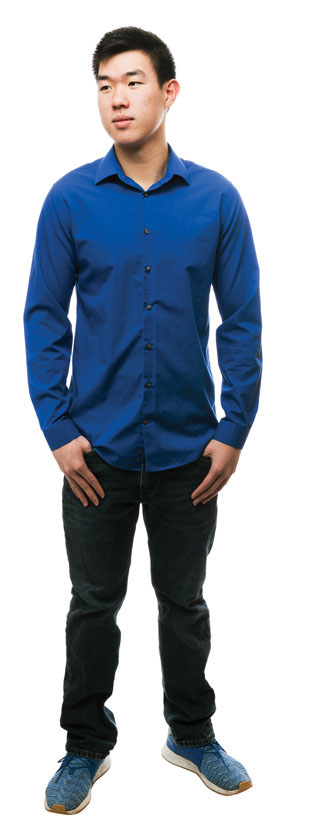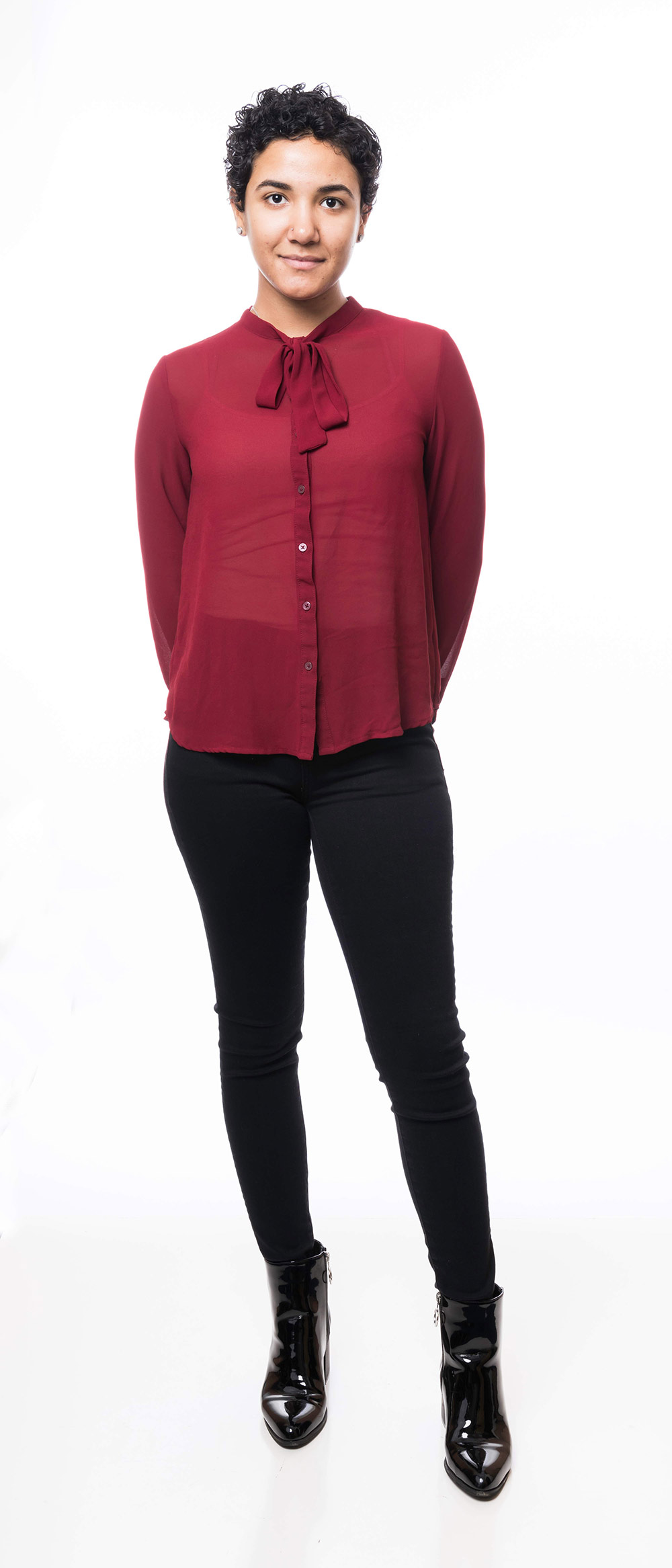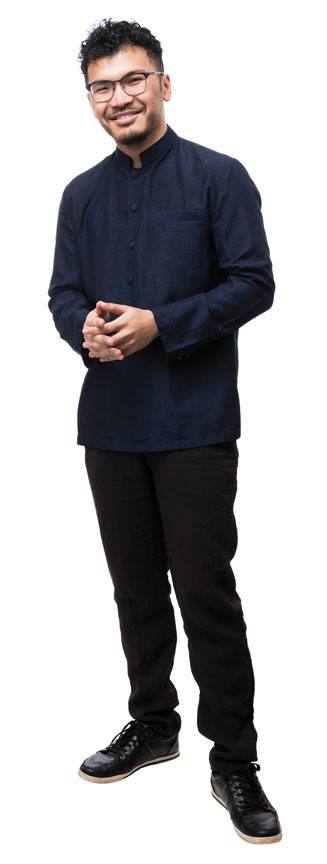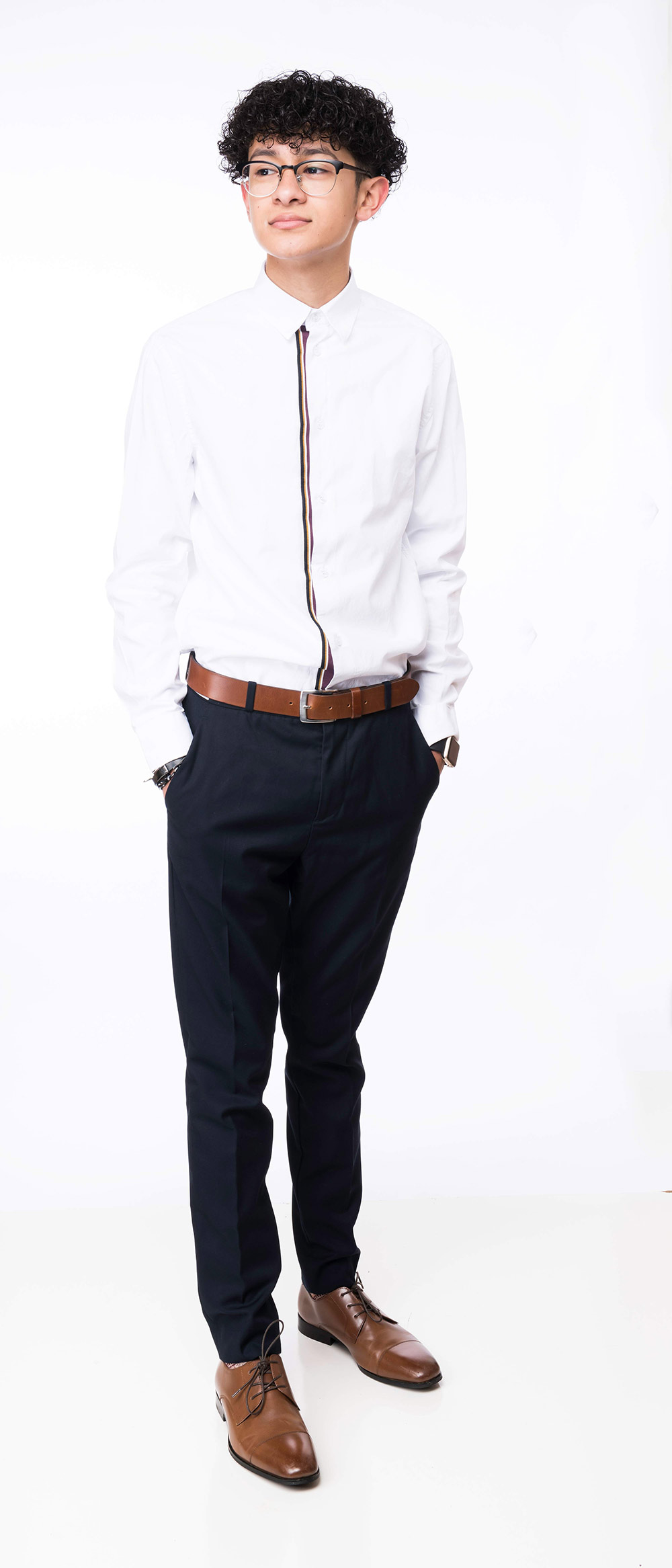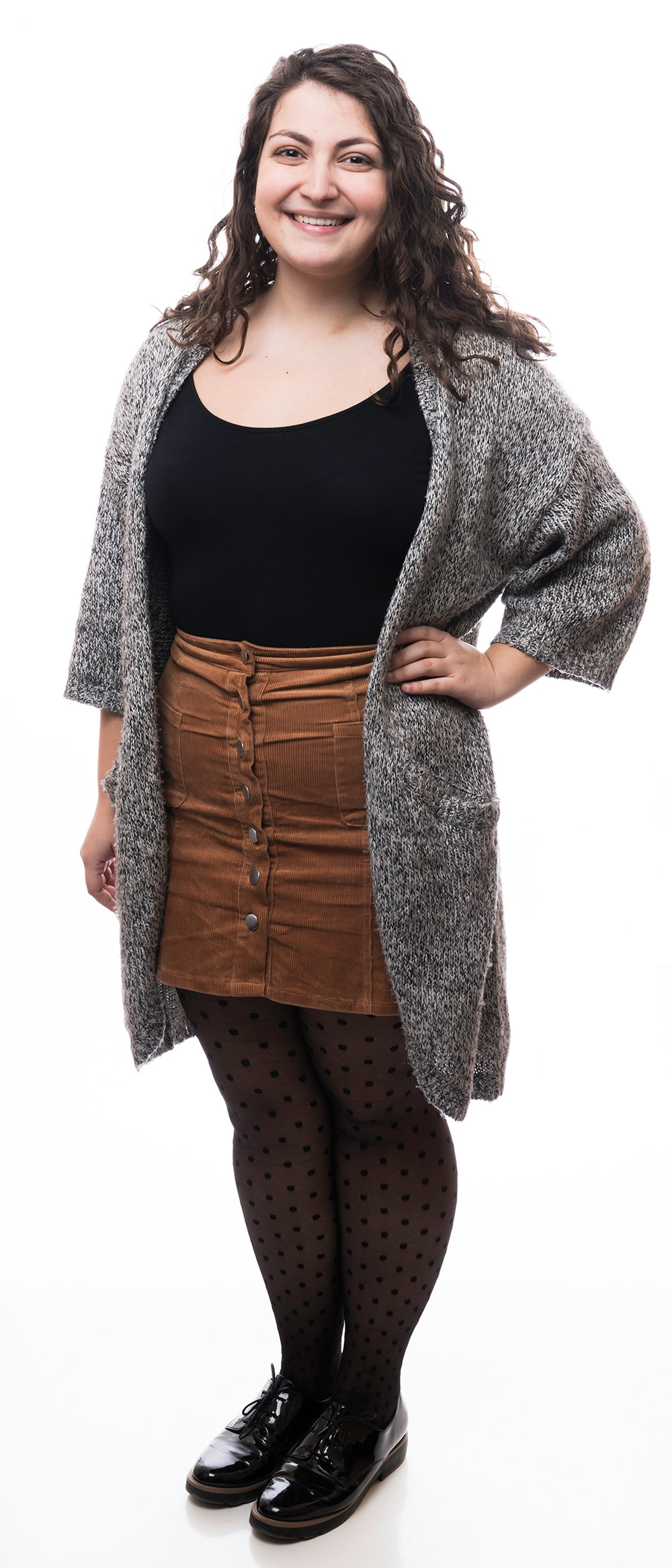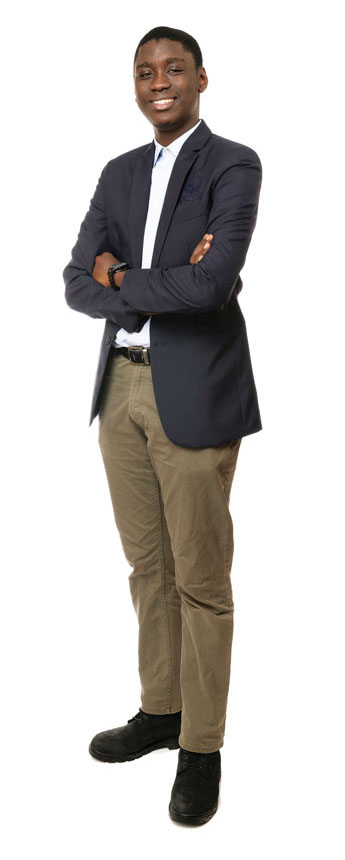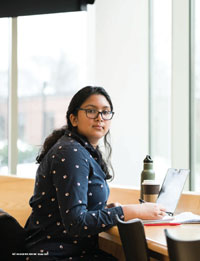Features
Maisha Idris ’19 dreamed of attending college as a child, despite long odds. Her parents were immigrants from Bangladesh who settled in New York City. Neither graduated from high school. Both worked low-paying jobs.
“I was fortunate to have teachers who emphasized the importance of a college degree, and my parents were very supportive,” Idris says. “I grew up feeling I would go to college, no matter what.”
Valedictorian of her high school class in Queens, Idris was accepted at Rochester. Through scholarships and financial aid, she was able to enroll. But her first year was difficult.
“I was confused about how to utilize all of the resources available to me and embarrassed about my background,” says the computer science major. “I regretted coming to college every day.”
The David T. Kearns Center, the University’s academic home for first-generation students, was a game changer for Idris. She met regularly with an advisor who made sure her studies were on track. She was introduced to the Center for Excellence in Teaching and Learning and learned better study skills.
“I went from feeling isolated to knowing there were people on campus dedicated to the success of students like me,” Idris says. “I finally felt I belonged.”
Last August, she received an Edmund A. Hajim Endowed Scholarship. Established by board chair emeritus Ed Hajim ’58, the scholarship is awarded to two engineering students per class who exhibit “academic strength, intellectual promise and innovative thinking.” She’s set to graduate in May and has a job offer in hand as a software engineer for Raytheon.
Idris’s story is striking, but not unusual at Rochester, where about 20 percent of undergraduates are first-generation, or “first-gen” students—those whose parents didn’t attend college. Several departments provide resources to help such students transition into college life, and a student organization offering peer-to-peer support to first-generation students was created last spring. Many students are aided by scholarships that lift the financial barriers that would otherwise prevent them from attending college.
“We are committed to the success of our first-generation student population,” says Jeffrey Runner, dean of the College.
According to Maureen Hoyler, president of the Council for Opportunity in Education in Washington, D.C., Rochester has a distinguished record among elite private universities in supporting low-income and first-generation students. In 1965, passage of the landmark Higher Education Act led to the creation of the federal TRIO programs—outreach and student services programs funded by the US Department of Education to provide help for students from disadvantaged backgrounds. Rochester has played “a critical leadership role” in TRIO, says Hoyler.
“The University has long recognized the need to provide comprehensive services to low-income and first-generation students. Its graduation rates are exceptional, and its record in preparing students in STEM (science, technology, engineering, and math) may be unmatched.”
Jonathan Burdick, vice provost for enrollment initiatives and dean of Admissions and Financial Aid, has a message for first-generation students.
“You’re not here based on some quota,” he says. “We turned thousands of applicants down. You’re here because you deserve to be here.”
Last fall, 22 percent of the members of the incoming class were first-generation students, the highest percentage in years. Burdick sees attracting and graduating first-generation students as a central part of the College’s mission.
“We’re not here to be a final line on a student’s glowing resume,” he says. “We’re here to be an engine of transformation for society. First-generation students need that more than anybody else.”
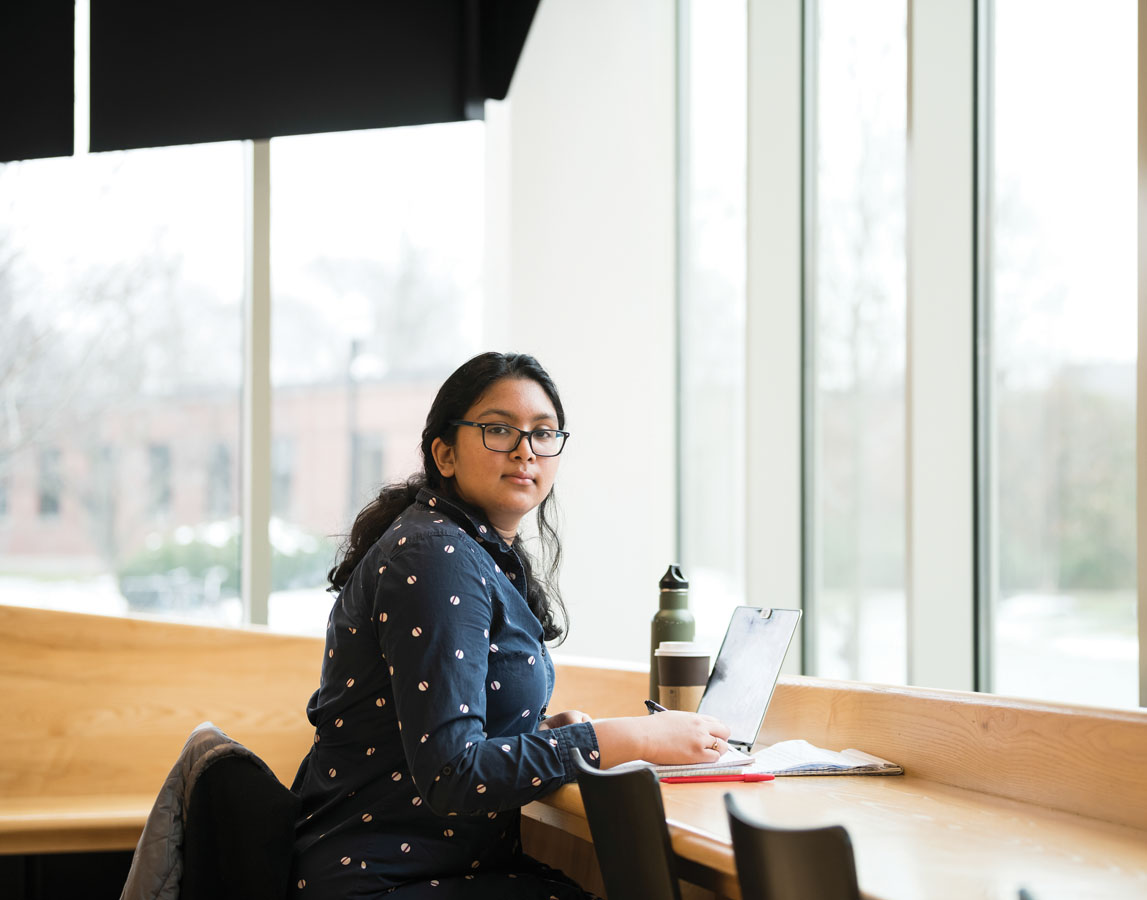 COLLEGE HOME: “I grew up feeling I would go to college no matter what,” says Hajim Scholar Maisha Idris ’19, who found a sense of belonging at Rochester as a first-generation student.
COLLEGE HOME: “I grew up feeling I would go to college no matter what,” says Hajim Scholar Maisha Idris ’19, who found a sense of belonging at Rochester as a first-generation student. Student Support
Campus programs and organizations reach out to first-generation students.
The Office of Minority Student Affairs has supported the needs of underrepresented and first-generation students for 50 years. Through the Higher Education Opportunity Program and the Early Connection Opportunity program, OMSA introduces first-generation students to college through social events, seminars, and introductory courses, and partners with University departments to provide help with writing, study skills, and leadership training.
“It’s critically important that we provide the type of support that helps first-generation students realize their academic and personal goals,” OMSA Director Norman Burnett says.
The David T. Kearns Center has worked with first- generation students since 1992, when the University received its first federal funding for the Ronald E. McNair Post-Baccalaureate Achievement Program. The center is also home to other federal initiatives, including Upward Bound programs and the Talent Search, that often serve first-generation students. Melissa Raucci, first-generation coordinator, says 80 percent of the 119 Kearns Scholars enrolled in the fall 2018 semester were first-generation students. In addition to having access to study groups, workshops, and career mentoring, Kearns Scholars enroll in a one-credit course called Navigating the Academy. Three-fourths of Kearns Scholars go on to graduate school.
The Office of Parent and Family Relations and the First-Generation Students and Families Committee host an orientation event each summer and created a website for families. In 2018, Parent and Family Relations initiated a program called Family Talk, where students chat in small groups with staff members from Parent and Family Relations and the University Counseling Center about concerns they might not be able to discuss at home.
“We create a space for students to identify with each other and give them strategies for how they can have those difficult conversations,” says Parent and Family Relations Director Dawn Bruner, who was once a first-generation student herself.
The First-Generation Students and Families Committee also sponsors a senior celebration for first-generation students, initiated the addition of the Gwen M. Greene First-Generation Senior Award as part of the Dean of Student’s Student Life Awards, and developed 1ST ONE, a campus community campaign to show support for first-generation students at Rochester.
The First Gen Society, established in 2018, offers peer-to-peer support through weekly meetings alternating between educational seminars on topics such as how to write a resume, as well as social events, such as painting pumpkins and a “Friendsgiving” feast.
—Jim Mandelaro
Few first-generation students can enroll at Rochester without financial support. According to a 2017 report from Insider Higher Ed, 27 percent of first-generation college students come from households making $20,000 or less. The University provides around $65 million annually in grants and scholarship to low-income undergraduates in Arts, Sciences & Engineering, opening doors that otherwise would remain closed.
At the same time, financial support alone is often not enough for first-generation students to make the most of their potential. In an age when affluent parents are increasingly tapping into their means and experience to help their children prepare for and navigate higher education, colleges and universities must have resources to offer similar support for students without those benefits.
In 2018, a $5 million gift from Kenneth French ’78S (MBA), ’83S (PhD) and his wife, Vickie, came out of a recognition of the importance of academic, as well as financial, support. The couple established the KRFrench Family Scholars Program to provide financial aid and a robust network of academic support for College undergraduates with high academic potential and financial need.
Although French wasn’t a first-generation student himself, he calls his time at Rochester “transformative.” “I was an engineer at Eastman Kodak after receiving my bachelor’s degree. I went to Rochester to get my MBA, and because of the excellent teaching I received, I discovered the excitement and vibrancy of economics and finance and decided to get my PhD. It’s been my life ever since.”
The Roth Family Distinguished Professor of Finance at Dartmouth College’s Tuck School of Business since 2011, he’s also a consultant to Dimensional Fund Advisors, a global investment firm, and a member of its board of directors. “First-generation students are special to Vickie and me,” French says. “These are students with great strengths and qualifications. With a little assist, we can put that human capital to work.”
The Frenches will add significantly to a network of resources the College already has in place to serve first-generation students. Those resources lend confidence to other scholarship benefactors that their investment at Rochester will be a good one.
Roger Birnbaum ’58 attended Rochester with his twin, Robert Birnbaum ’58, and graduated with a degree in business. Since 1991, he has been president of the Princeton Healthcare Group. Concerns about the rising costs of higher education, combined with income and wealth inequality, prompted him in 2014 to establish the Roger Birnbaum Family Scholarship for the Kearns Center Scholars Program, awarded to students who are low-income, first-generation, or underrepresented minorities.
“We’re losing a whole generation of kids who have all this potential but are being priced out of the higher education market,” he says. “Some of these kids are fortunate enough to get scholarships and financial aid but aren’t prepared socially. They can drown in school. The Kearns Center embraces these kids and provides the support that can make the difference between success and failure.”
Prudence Bradley ’88 (PhD) was a first-generation student who had a successful career in pharmaceutical research and development. She established the Prudence K. Bradley Endowed Scholarship for first-generation Rochester students with financial need with a preference for students pursuing degrees in STEM fields. Bradley recipient Marines Espinal ’21, an environmental science and American Sign Language double major who moved from the Dominican Republic to New York City when she was 10, was able to get a head start at Rochester through the Early Connection Opportunity program overseen by the College’s Office of Minority Student Affairs.
“Without the Bradley Scholarship, I wouldn’t have been able to attend Rochester,” she says. “I’m grateful and blessed.”
Adjusting to college can be challenging for any student, and to some extent, the growth of services targeted at first-generation students is part of a larger expansion of academic and other types of supports for all students that’s now almost universal in higher education. But at elite private universities such as Rochester, first-generation students are especially vulnerable to feelings of isolation. Sometimes, they feel misunderstood by classmates from more affluent backgrounds.
“There’s sometimes an assumption that first-generation students are only [members of underrepresented minority groups], or that they’re not bright,” says Dawn Bruner, director of the Office of Parent and Family Relations. “That’s not true. They’re diverse, intelligent, and engaged students who have worked hard to be here.”
Once a first-generation student herself, Bruner says first-generation students often believe they’re the only ones having difficulty at school. “In reality,” she says, “every student struggles at some point.”
In spring 2018, Pech Chhun ’19 created a new student organization, the First Gen Society, offering first-generation students peer-to-peer support. “We thought it was important to have a group where first-generation students could relate to and support each other,” says Chhun, a clinical psychology and biology double major who moved from Cambodia to Rochester when he was eight. Chhun is a Brady Scholar, a scholarship program established by University Trustee Elizabeth Pungello Bruno ’89.
Weekly meetings alternate between educational seminars on topics such as how to write a résumé to social events, such as painting pumpkins and a “Friendsgiving” feast.
Society member Scott Saucier ’19, an economics and political science double major from Wolcott, Connecticut, says his struggles were more social than academic his first year. “I had trouble making friends,” he says.
Saucier, a beneficiary of the Schiff Family Scholarship Fund, established with an estate gift from Hans ’43 and Merle Schiff, stresses the importance of getting involved. He found a friend group with the Baja SAE team and added roles as an RA, as a first-year fellow, and with orientation. “Gradually, I started to find my way here.”
Another member, Allison Morningstar ’19, was valedictorian at her high school in York, Pennsylvania, but recalls how defeated she felt after her first midterm exams. The neuroscience major found a spot behind the Interfaith Chapel and called her mother in tears, telling her, “I shouldn’t be here. If I can’t do well at these things, how will I succeed at anything else?”
The tide turned when she was awarded the Carolyn E. and Jeffrey A. Stone MD Current Use Undergraduate Scholarship, established by Jeffrey Stone ’87, ’91M (MD) and Carolyn Stone ’87. “It showed me there are people who believe in me,” Morningstar says. She became a Kearns Scholar, then a research assistant at the Medical Center. Last spring, she was one of 13 Rochester students elected to the Phi Beta Kappa honor society as a junior.
Last year, Chhun was speaking to students from the Rochester City School District about the importance of higher education when one of the students expressed his disdain for college. Chhun was taken aback but chatted with the student about the importance of a degree.
“Many students who don’t have a college background in their family see it as a big bill, something completely irrelevant in their life,” he says. “I think it’s a misconception. If a student wants to go to college, there are people who will move mountains for you to go and thrive in college. I’ve seen it here at the University. I’m proof of it.”
For more student profiles, visit the Newscenter.

